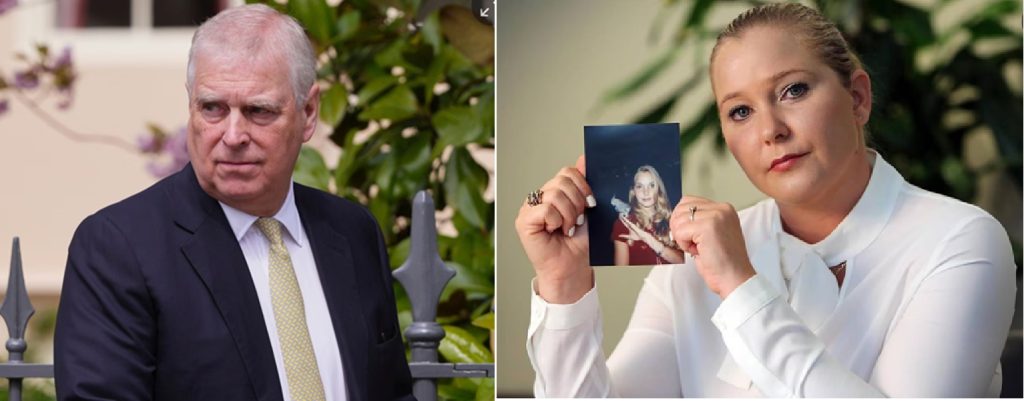A posthumous memoir reopens old wounds and raises new questions about power, privilege, and the unfinished reckoning of the Jeffrey Epstein saga.
When Virginia Giuffre’s memoir Nobody’s Girl was released this week, it was not only a haunting farewell from a woman whose life had been consumed by trauma and litigation — it was also an explosive reminder that the shadow of Jeffrey Epstein’s crimes still stretches deep into the upper reaches of British royalty.
Giuffre, who died by suicide in April at the age of 41, left behind a manuscript that pulls no punches. In it, she accuses Prince Andrew’s team of trying to hire “internet trolls to hassle” her during the run-up to her 2022 civil case, describes the royal’s alleged attempts to hide from court papers “behind the well-guarded gates of Balmoral,” and recounts in painful detail how she was forced into sexual encounters with the Duke of York as a teenager trafficked by Epstein.
For Buckingham Palace, the publication of Nobody’s Girl could not have come at a worse time. King Charles has been attempting to steady the monarchy after years of public scandal and personal loss. But the renewed focus on Andrew — and the memoir’s disturbing mixture of confession, evidence, and fury — has reignited debate over whether the prince should be formally stripped of his remaining titles and privileges.
A Settlement That Spoke Volumes
In 2022, Giuffre and Prince Andrew reached a confidential settlement in her New York civil case. Reports at the time suggested the amount was around $12 million, though neither side confirmed the figure. The agreement brought an end to a legal standoff that had already inflicted irreparable damage on Andrew’s reputation — one that began with his disastrous 2019 Newsnight interview, where he denied ever meeting Giuffre and bizarrely claimed he was “unable to sweat” due to a medical condition.
Giuffre writes in her memoir that the settlement was about more than money. “We were going to ask for the moon,” she recalls, “but my team had agreed it had to be more than mere money.” What she wanted was acknowledgment — and, if possible, an apology.
After years of public denials and counter-narratives, she saw the final settlement statement — in which Andrew accepted that she was an “established victim of abuse” — as a form of vindication. “I gained more out of Andrew than money,” she wrote, “because I had an acknowledgment that I and many other women had been victimized, and a tacit pledge to never deny it again.”
Yet even that compromise came with limits. Giuffre accepted a one-year gag clause, reportedly at the prince’s insistence, to avoid overshadowing Queen Elizabeth II’s Platinum Jubilee. “It seemed important to the prince,” she explained, “because it ensured that his mother’s Jubilee would not be tarnished any more than it already had been.”
The ‘Troll’ Campaign and Alleged Smear Efforts
Perhaps the most explosive new claim in Nobody’s Girl concerns what Giuffre describes as a deliberate online campaign of harassment. “After casting doubt on my credibility for so long,” she wrote, “Prince Andrew’s team had even gone so far as to try to hire internet trolls to hassle me.”
While Giuffre does not name specific individuals involved, the allegation suggests that Andrew’s camp was not merely engaged in legal defense but also in an organized attempt to undermine her publicly. The claim adds a sinister dimension to a saga already defined by manipulation, secrecy, and abuse of power.
The Mail on Sunday recently reported that the Metropolitan Police is now “actively investigating” whether Andrew supplied Giuffre’s personal data — including her date of birth and U.S. social security number — to a police protection officer in an attempt to “dig up dirt.” The newspaper claims to have obtained an email, sent by Andrew in 2011, to Queen Elizabeth’s deputy press secretary, stating that he had asked a protection officer to investigate Giuffre’s background and “check if she had a criminal record.”
That request, allegedly made hours before the now-famous photograph of Andrew with a teenage Giuffre was published, has re-energized calls for full transparency.
So far, the Metropolitan Police have confirmed only that they are “assessing the information.” Andrew, through his lawyers, continues to deny all wrongdoing and has maintained his innocence of Giuffre’s allegations.
Hiding Behind the Gates of Balmoral
Giuffre’s memoir paints a striking picture of a royal retreat turned refuge. As her lawyers tried to serve court papers in 2021, she says, the prince “fled to Balmoral Castle in Scotland and hid behind its well-guarded gates.”
The image — of a senior royal using one of Britain’s most famous estates to shield himself from the law — has become emblematic of a larger issue: the perception that Andrew has been protected by privilege even as others in Epstein’s circle faced criminal consequences.
“Initially, the prince made it difficult for my lawyers to serve him with papers,” she wrote. “He was hiding from accountability, surrounded by protection that only power and lineage can afford.”
The moment underscores a wider frustration that continues to resonate — not just in the UK but globally — about how institutions respond when one of their own is accused of serious misconduct.
A Memoir Written for Justice — and for Closure
Giuffre’s decision to write Nobody’s Girl was, in her words, an attempt to “free myself from my past.” But the tone of the book is less one of release and more of a reckoning. It is a document that intertwines personal trauma with systemic critique — of how the wealthy and powerful can manipulate justice, silence victims, and rewrite narratives.
“I hadn’t wanted to have sex with the prince,” she wrote of one encounter in London, “but I felt I had to. I believed there was no way to free myself from Epstein and Maxwell’s grip.”
She also reflects on the climate of fear surrounding the powerful people involved — even citing the conspiracy theories about Princess Diana’s death as a factor that amplified her sense of helplessness. “I was surrounded by people who wielded vastly more clout than I ever would,” she recalled.
In one poignant passage, she admits that retelling her story had taken a toll: “I don’t regret it, but the constant telling and retelling has been extremely painful and exhausting.”
Shortly before her death, Giuffre emailed her co-writer, journalist Amy Wallace, expressing her wish that the book be published regardless of her circumstances. “This work,” she wrote, “aims to shed light on the systemic failures that allow the trafficking of vulnerable individuals across borders.”
The Interview That Changed Everything
No single moment was more damaging to Prince Andrew’s reputation than his 2019 Newsnight interview with Emily Maitlis. Intended as an opportunity to clear his name, the broadcast instead became a masterclass in public self-destruction.
Andrew denied ever meeting Giuffre, claimed he was at a Pizza Express restaurant with his daughter Beatrice on the night in question, and bizarrely offered the now-infamous explanation that he could not sweat at the time due to a medical condition. He expressed no empathy for Epstein’s victims and failed to apologize for his association with the convicted sex offender.
“As devastating as this interview was for Prince Andrew,” Giuffre wrote, “for my legal team it was like an injection of jet fuel.” She said it helped her lawyers build an “ironclad case” and even consider subpoenaing members of the royal family — including Sarah Ferguson and their daughters — to test the prince’s alibi.
That interview led directly to Andrew’s withdrawal from public life, which Buckingham Palace described as “for the foreseeable future.” In practice, it was an exile from which the prince has never recovered.
Titles in Limbo, Reputation in Ruins
Before the release of Nobody’s Girl, Andrew announced that he would no longer use his Duke of York or Knight of the Order of the Garter titles, though both remain legally extant. The symbolic gesture did little to quell calls for the monarchy — and Parliament — to formally strip him of his dukedom altogether.
So far, the government has declined to intervene. Downing Street said the issue was “a matter for the palace in the first instance,” while Prime Minister Rishi Sunak’s spokesperson emphasized that ministers “support the judgment of the king.”
But public pressure is mounting. In the wake of Giuffre’s death and the memoir’s publication, MPs across parties have called for a clear constitutional mechanism to revoke royal titles when conduct brings them into “disrepute.”
King Charles, meanwhile, has sought to project stability. On Monday, as he visited Manchester to show solidarity with the Jewish community after the recent synagogue attack, he faced fresh headlines questioning whether his brother’s continued status was compatible with the values of a modern monarchy.
A Mirror to Power
Beyond its royal intrigue, Nobody’s Girl is a devastating commentary on power itself — how it operates, how it shields, and how it corrupts. Giuffre’s account connects her personal ordeal to the broader failure of institutions to protect victims of sexual exploitation.
Her foundation, Speak Out, Act, Reclaim (SOAR), established after the settlement, was intended to help survivors of trafficking. She wrote that she looked forward to using “the Crown’s money to do some good,” a line that blends defiance with grim irony.
For survivors of Epstein’s network, Giuffre’s death was a reminder of how heavy that burden can be. Advocates have described her as a “warrior for truth” who never stopped pushing for accountability — even when the legal system offered little comfort.
Unfinished Reckoning
Prince Andrew’s defenders have long argued that he has “paid the price” by losing his royal duties and public standing. But critics say the real debt remains unpaid — not only to Giuffre but to the principle of accountability itself.
The Epstein scandal exposed an underworld where wealth, power, and sex crimes intersected with impunity. Even after Epstein’s death and Ghislaine Maxwell’s imprisonment, the system that enabled them remains largely unexamined.
Giuffre’s final words in her memoir strike a note of weary hope: “From now on, anyone who wants to know about what happened can sit down with Nobody’s Girl and start reading.”
It is both an invitation and an indictment — a challenge to the world to confront what it would rather forget.
Epilogue: Silence and the Crown
As the royal family attempts once again to move forward, the questions raised by Giuffre’s memoir linger in the air like a moral fog. What does justice look like when the accused is a prince? What becomes of the truth when power decides it is inconvenient?
Prince Andrew may never face a courtroom again. But in the court of public opinion — and in the pages of Nobody’s Girl — his accuser has already rendered her verdict.
And for the monarchy, that judgment may prove harder to escape than any subpoena.
About Author
You may also like
-
Cara Hunter Reveals How a Deepfake Video Almost Destroyed Her Political Career
-
UN Security Council Endorses Donald Trump’s Gaza Peace Plan Resolution Passes 13–0, China and Russia Abstain
-
Generation Z Protests Against Corruption and Drug-Related Violence Rock Mexico, Over 120 Injured as Demonstrations Across the Country Turn Violent
-
CIVIL SERVICES (MAIN) EXAMINATION 2025
-
Over a Million Evacuated in the Philippines as Super Typhoon Fung-Wong Nears Landfall Manila, 9 November 2025 — Agence France-Presse


